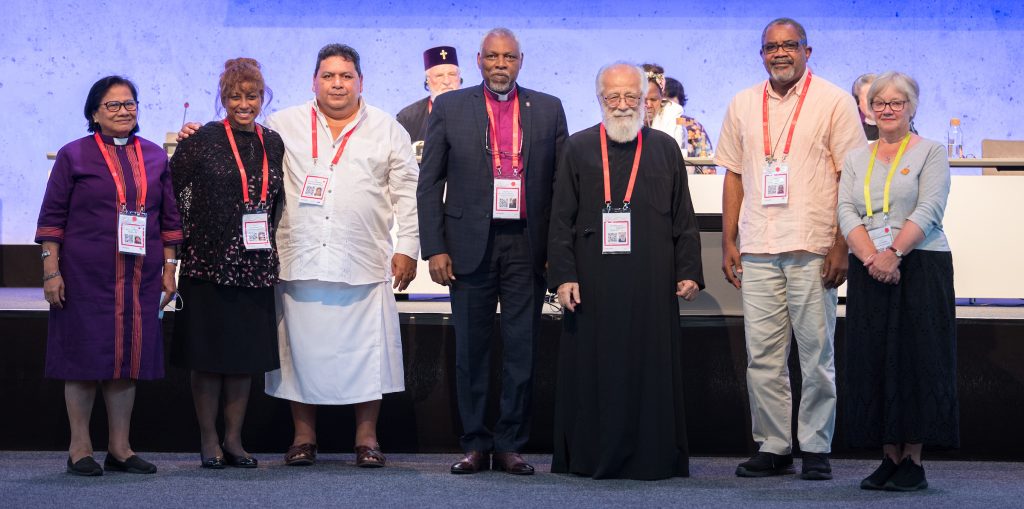Thousands of Christians converged on the German city of Karlsruhe for the 11th Assembly of the World Council of Churches (WCC), the first in Europe since Uppsala in 1968.
The theme of the event was “Christ’s love moves the world to reconciliation and unity.”
A formal purpose
The Assembly is the supreme legislative body for the WCC. It meets to review policy and practice and make appointments to the senior offices of the Council. It appoints a 150-member Central Committee to serve as the main decision-making body of the WCC between assemblies. It is responsible for carrying out the policies adopted by the assembly, reviewing and supervising WCC programmes, and managing the WCC budget.
Two people from the English context were elected onto the Central Committee. Lucy Docherty a delegate of the Church of England and Bishop Mar Awraham Youkhanis from the Holy Apostolic Catholic Assyrian Church of the East (ACOTE). And Sarah Moore from the United Reformed Church was re-elected onto Central Committee.
Rev Dr Susan Durber, a URC minister, was also elected as the WCC President representing Europe. The role of the WCC presidents, each of whom represents a continent, is to promote ecumenism and interpret the work of the WCC, especially in their respective regions. The presidents are ex-officio members of the WCC Central Committee.

Addressing the world’s challenges
The gathering also discusses the global context in which it meets hearing from representatives from churches across the world.
The WCC 11th Assembly issued four public statements expressing concern and suggesting ways to address some of the world’s major challenges.
“Living Planet: seeking a just and sustainable global community.”
This statement raises an increasingly urgent voice of concern and demand for action. “Christ’s love calls us to deep solidarity and a quest for justice for those who have contributed to this emergency the least, yet suffer the most, physically, existentially, and ecologically,” reads the statement.
“The Things that Make for Peace; moving the world to reconciliation and unity.”
This statement calls for a renewed commitment to peace. Recognizing the need for, “renewed dialogue within the ecumenical movement,” the statement strongly affirms “the commitment of the WCC and its member churches to peacemaking through inter-religious dialogue and cooperation at all levels,” and calling for a global ceasefire.
“War in Ukraine, Peace and Justice in the European Region.”
The statement appeals “to all sides in the conflict to respect the principles of international humanitarian law…especially with regard to the protection of civilians and civilian infrastructure, and for the humane treatment of prisoners of war.” It strongly affirms that war is incompatible with God’s very nature.
“Seeking Justice and Peace for All in the Middle East”
The assembly heard the increasing pleas of the Holy Land heads of churches concerning mounting intimidation, violations, limiting access to places of worship, and attacks by radicals.
“The WCC affirmed the rightful place of Israel in the community of nations, recognizing its legitimate security needs. “At the same time, we affirm the right of the Palestinians for self-determination and that the Israeli occupation of the Palestinian territories since 1967, as well as settlement construction and expansion in the occupied territories, is illegal under international law and must be ended.”
The Unity Statement
The Assembly received, adopted, and approved a Unity Statement of the WCC 11th Assembly, which addresses the distinctive call to Christian love in today’s world. Successive WCC assemblies have offered a statement or theme to inspire the churches to reflect on why they have chosen to journey together and the significance of the call to unity.
Read the Unity Statement in full.
A Call to Act Together
“The Love of Christ urges us on.” (2 Cor. 5:14)
As it ends, every WCC Assembly releases a message to convey the experience of the assembly and the renewed commitment of its participants.
“In our assembly, we have used many words, but from these we have fashioned a new resolve. Now we ask God’s assistance to transform our commitments into action. We commit ourselves to working with all people of good will. As we reflect on the fruits of our work in Karlsruhe, we invite all to become pilgrims together. For in Christ, all things will be made new. His love which is open to all, including the last, the least, and the lost, and is offered to all, can move and empower us in a pilgrimage of justice, reconciliation, and unity.”
Read the Assembly message in full.
Other resources
CTE’s representative Rev Dr Ben Aldous reflects on his time at the Assembly.
Watch Ben’s vlogs (short videos) recorded during the Assembly.
Share reflections from WCC delegates and attendees from our national Member Churches.
Churches Together in Britain and Ireland’s report on the 11th WCC Assembly.